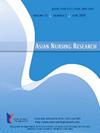Effects of Breastfeeding Knowledge and Health Beliefs Regarding Gestational Diabetes Mellitus on the Breastfeeding Intention of Pregnant Women
IF 2.1
3区 医学
Q2 NURSING
引用次数: 0
Abstract
Purpose
This study aims to explore the relationships between gestational diabetes mellitus (GDM)-related breastfeeding knowledge, GDM-related breastfeeding health beliefs, and breastfeeding intention. It investigates the factors influencing breastfeeding intention among pregnant women in Nepal.
Methods
A total of 229 healthy pregnant women visiting an antenatal clinic in Nepal participated in this study between January and March, 2023. They completed a questionnaire that assessed their GDM-related breastfeeding knowledge, GDM-related breastfeeding health beliefs, and breastfeeding intention. The data were analyzed using descriptive statistics, an independent t-test, one-way analysis of variance including Scheffé’s post hoc test, and logistic regression analysis.
Results
Of the participants, 86.9% (n = 199) indicated positive breastfeeding intention, even with a relatively low level of GDM-related breastfeeding knowledge. Logistic regression analysis of the factors influencing breastfeeding intention yielded a significant model (χ2 = 38.80, p < .001) with significant variables; GDM-related breastfeeding knowledge [odds ratio (OR): 1.0, 95% confidence interval (CI): 1.02–1.40], GDM-related breastfeeding health beliefs (OR: 1.09, 95% CI: 1.04–1.15), and immediate family experience with diabetes mellitus (OR: 5.38, 95% CI: 1.98–14.62).
Conclusion
Nurses should lead interventions to educate pregnant women about the benefits of breastfeeding that can help in mitigating the long-term effects of GDM and reinforce health beliefs through positive experiences. This study provides information demonstrating the need for nurse-led improvements in Nepal's GDM management system, from screening to comprehensive care.
妊娠期糖尿病母乳喂养知识和健康信念对孕妇母乳喂养意愿的影响
目的:探讨妊娠期糖尿病(GDM)相关母乳喂养知识、GDM相关母乳喂养健康信念与母乳喂养意愿的关系。调查了尼泊尔孕妇母乳喂养意向的影响因素。方法:于2023年1月至3月在尼泊尔一家产前诊所就诊的229名健康孕妇参与了本研究。她们完成了一份调查问卷,评估她们与gdm相关的母乳喂养知识、与gdm相关的母乳喂养健康信念和母乳喂养意图。采用描述性统计、独立t检验、单因素方差分析(含scheff事后检验)和logistic回归分析对数据进行分析。结果:86.9% (n=199)的参与者表示积极的母乳喂养意愿,即使gdm相关的母乳喂养知识水平相对较低。对影响母乳喂养意愿的因素进行Logistic回归分析,得出具有显著性的模型(χ2=38.80, p)结论:护士应主导干预措施,教育孕妇母乳喂养的好处,有助于减轻GDM的长期影响,并通过积极的经历增强健康信念。这项研究提供的信息表明,尼泊尔的GDM管理系统需要护士主导的改进,从筛查到综合护理。
本文章由计算机程序翻译,如有差异,请以英文原文为准。
求助全文
约1分钟内获得全文
求助全文
来源期刊

Asian Nursing Research
NURSING-
CiteScore
4.20
自引率
4.50%
发文量
32
审稿时长
45 days
期刊介绍:
Asian Nursing Research is the official peer-reviewed research journal of the Korean Society of Nursing Science, and is devoted to publication of a wide range of research that will contribute to the body of nursing science and inform the practice of nursing, nursing education, administration, and history, on health issues relevant to nursing, and on the testing of research findings in practice.
 求助内容:
求助内容: 应助结果提醒方式:
应助结果提醒方式:


